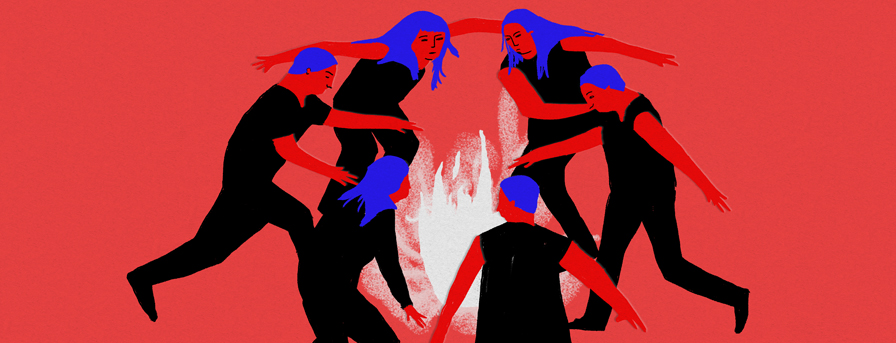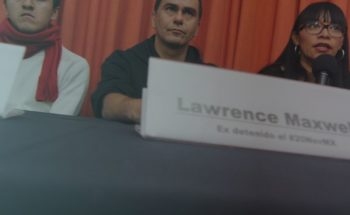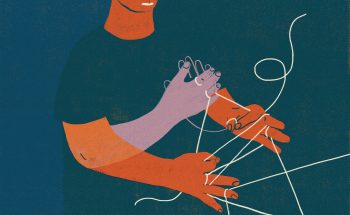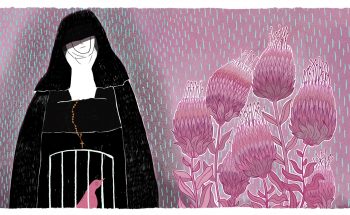
Translation – I won’t Pay!
Share:
[Daniel Alarcón, host]: Ok, in this story, there is only one place to start…Here:
(SOUNDBITE FROM YOUTUBE VIDEO)
[Francisco Papas Fritas]: You don’t have to pay anymore, brothers and sisters, you don’t have to pay anymore, no more. Don’t fear, families, that your houses are going to get seized and taken away, and all your things, your little things…
[Daniel]: This audio comes from a video that came out in May, 2014. And it shows a bearded man wearing large 60’s-style glasses. He is wearing a hat and is sitting in front of a light that casts his shadow against a wall.
It gives the impression of being a video from a guerrilla making a declaration from a secret hide-out.
(SOUNDBITE FROM YOUTUBE VIDEO)
[Papas Fritas]: I’m not someone who could run for president. I am not a senator. I am not a city counselor or a mayor. I am a person like you, a person who found in art the potential to be able to say the things I feel, that I have to say.
[Daniel]: And he introduced himself as Francisco Papas Fritas. A Chilean artist. And he confesses in the video that he just burned the promissory notes of thousands of students at a private university, the Universidad del Mar.
A debt valued at nearly 500 million dollars.
And they called him… “The Chilean Robin Hood.”
[Dennis Maxwell, producer]: All of us Chileans saw this video.
[Daniel]: This is our producer, Dennis Maxwell.
[Dennis]: And a lot us wondered ‘who is this guy?’ So I started researching a little more and I found out that there was much more to this story.
[Daniel]: And this is what Dennis found.
[Dennis]: In order to understand this video and everything Papas Fritas represented, we have to backtrack a little. Because this story mainly has to do with the Chilean education system.
Since the mid 2000’s, Chilean students maintained a large-scale protest movement.
(SOUNDBITE FROM PROTEST VIDEO)
They organized marches with more than 150 thousand people. They demanded that education be high quality and free for all Chileans. And they wanted to put an end to profit and privatization in education, the model imposed during Augusto Pinochet’s dictatorship.
One of the most controversial private universities was the Universidad del Mar, which managed to establish 15 locations throughout Chile. The students in this institution participated in the protests as well. They were fed up with the abuses committed by the owners of the university, who went months without paying the professors.
In addition, an investigation had revealed that university accreditation was acquired through bribery.
The dean Héctor Zúñiga —who was also one of the university’s owners— was accused of being involved in a number of crimes, which ranged from bribery to money laundering. At the start of 2012, a year and a half before Papas Fritas released his video, Zúñiga entered into preventive detention.
[Raúl Soto]: These men don’t work. They’re shit. They’re a bunch of parasites.
[Dennis]: This is Raúl Soto. I spoke with him and his partner, Camila Beaumont, while they were with their baby in their home in Viña del Mar. In 2012, they both studied at Universidad del Mar, and Raúl was one of the student leaders.
[Raúl]: At that point we wanted them removed; we didn’t need the owners. Education can develop with workers, professors and students, which are the three groups that are needed.
[Dennis]: Raúl, like many other students, was outraged at the situation his university was in.
On December 26th, 2012, the ministry of education released an announcement stating that they were going to begin the process of closing the Universidad del Mar. In his statement he did not provide greater detail, he only said that the university was involved in a series of wrongdoings. At the same time the minister called for students to remain calm. But of course, it wasn’t easy. The students ran the risk of not being able to finish their degrees. To make matters worse, they would still be tied to an enormous debt. According to a former student from this university, the average amount a student owed was around $15,000 dollars.
Raúl and a hundred fellow students got organized right away, and two days after this announcement, they decided to take over Universidad del Mar’s central headquarters. And then other locations across Chile fell like dominos in the student’s hands.
[Raúl]: They started holding take-overs, demonstrations, strikes… And they all had the same goal, trying to keep the University from closing and defending education.
[Dennis]: The Universidad del Mar’s central headquarters is in the coastal city of Reñaca. Let’s just say that the people living in Reñaca are comfortable. But many students come from lower-income families and live in humbler areas. Some were from families of fisherman that after going out to fish in the early morning, they went to class. And here is where the contrast between the owners of the university and the student population becomes apparent.
A group of about 300 students moved into the main headquarters building. This is Camila, who also participated in the take-over.
[Camila Beaumont]: At first, we would sleep on the floor, we didn’t even have a mat. I remember taking my jacket and laying it on me because in Reñaca it is really, really cold.
[Dennis]: They were there for days, weeks, and they took control of the place. One day in January, 2013…
[Raúl]: We were playing ping-pong in a classroom, and the rooms had these doors like in old schools, next to the blackboard and I lean against the door and it opens to another room. And we realized that we had never looked into what was inside those doors, and there were a bunch of documents.
[Dennis]: Raúl and Camila sat down to read the documents, one by one. They showed them to a few law student friends to help them understand.
[Raúl]: A lot of papers that revealed little by little how they were stealing money from the students.
[Dennis]: What they had in front of them seemed like a treasure trove. And well, I haven’t been able to confirm this, but according to Raúl, the documents showed, for example, that the owners had created a travel agency, that charged consultancy fees to salmon companies, and used university money to pay for their personal expenses like phone bills and stays at luxury resorts.
[Raúl]: And then, when we opened that door by chance, we found ourselves wanting to open every door in the university to find even more information.
[Dennis]: And so, throughout the following weeks, they found more and more documents.
[Raúl]: And then we started to realize how dirty they all had been and how connected to political power they had been. Everything leading up to that fired up our anger, our disappointment, our fury…
[Dennis]: And here is where Francisco Papas Fritas, the artist we met at the beginning, enters the story. Papas Fritas didn’t study at Universidad del Mar, but Raúl said that a worker at the university, who was in charge of all the keys, knew him. And it occurred to him to invite him to the take-over…
[Papas Fritas]: So that I could do some kind of performative act, or some artistic act that could make what was happening at Universidad del Mar even more visible. And we started to see the possibilities and the possibilities came out the students themselves.
[Dennis]: Papas Fritas spent the month of March, 2013 with the students, living with them in the take-over. Later he would return to visit them several times. He traveled from Santiago, which is about an hour from Reñaca, and sometimes stayed for one or two days…
[Raúl]: In comes Papas Fritas to see our situation, lend us clothing and share his idea of how we could advance the project of public education in that expensive sham of an institution, Universidad del Mar. That was the general idea. And Papas Fritas always planted that idea in us: the idea that we had to do away with that debt.
[Dennis]: Raúl is referring to the debt the students had at the University. They agreed with Papas Fritas that they somehow had to make the promissory notes disappear. But how?
Here we have to explain something rather important and perhaps surprising: if something happens to the promissory note —the document recording the amount of debt— the student in debt can ignore their debt, and does not have to pay it.
One day in April, 2013, four months after having taken over the main headquarters, Raúl and Camila left the take-over to go to Santiago to meet with other students from other universities. They were there when they got a call saying:
[Camila]: That there had been a fire in Zúñiga’s house; that the chimney was burning.
[Dennis]: Héctor Zúñiga, remember, was the dean and one of the owners of Universidad del Mar. His lavish mansion in the hills of Reñaca was burning not far the central headquarters of the university. Zúñiga was at home at the time of the fire. He had been under house arrest since February.
It didn’t take long for Zúñiga’s family to blame the students for causing the fire. They talked about a supposed attack. And that is what they said to the press. But later the fire department discredited that, and some media outlets reported that the fire had started for a different reason: the chimney overheated, and inside firemen found a large amount of burned paper.
And where did those burned papers come from? Well, Camila says that some of the students saw Zúñiga’s children near the university a few hours before the fire and that they found signs of someone entering the dean’s office. Camila and her friends believe that the dean’s children took the papers to burn them, but that is just a theory.
A few days after the fire, Papas Fritas returned to the university’s headquarters. He shared an idea that stemmed from the fire at the dean’s house:
[Raúl]: Burning the university’s promissory notes.
[Camila]: He gave us the idea, like the seed of what we could do. We consulted our lawyer and he said: “You just have to do it, that’s it. You aren’t going to have any problems, even if you recognize that you’re committing a crime, if they don’t have the evidence of the crime, they can’t do anything.”
[Daniel]: We’ll be back after a break.
[Ad]: Support for this NPR podcast and the following message come from Squarespace. A dream is just a great idea that doesn’t have a website yet. Customize your website’s look and feel, settings, products, and more with just a few clicks. Head to Squarespace.com for a free trial and when you’re ready to launch, use the offer code RADIO to save 10% off your first purchase of a website or domain. The future is coming. Make it brighter. With Squarespace.
[Ad]: Support for this NPR podcast and the following message come from Sleep Number, offering beds that adjust on each side to your ideal comfort. Their newest beds are so smart, they automatically adjust to keep you both sleeping comfortably all night. Find out why nine out of 10 owners recommend. Visit a Sleep Number store near you.
[Dennis]: The thought of burning promissory notes kept going through the student’s heads. But there was one problem:
[Raúl]: We had data, information, but we…we didn’t know where in that whole mess of a university they kept the letters.
[Daniel]: Dennis will continue the story.
[Dennis]: When he says “the letters” he is referring to the promissory notes. And even though they had looked all over the headquarters, they couldn’t find them. They had to act fast.
At this point, they take-over had been going on for 6 months and 80 to 100 students stayed there. Some lived there permanently, others came and went. But they didn’t know how long they could keep it up.
[Camila]: Because it was… it was like that was the time because if they managed to get us out of the building we would really lose the opportunity to free ourselves from that debt.
[Dennis]: There were a few places where the promissory notes could have been kept, and one those was a place that was difficult to access: a vault on the 11th floor of the central headquarters.
Raúl had needed to go back to Santiago when he got a call from his fellow students who were at the take-over.
[Raúl]: The guys called me saying that they were just about to open the vault that they thought the letters were in.
[Dennis]: Raúl practically flew back to Reñaca. When he returned the students had recently managed to force open the door to the vault.
Once they got in, they couldn’t believe what they found.
[Raúl]: It was files and files, files and files and files and files stored in a room where there were student debt records agreed until 2030, for millions of dollars, millions an unimaginable amount of money.
[Dennis]: They were nervous, but on the other hand they felt like they had an opportunity. They kept going back to Papas Fritas’ idea, and now, finally they had the documents. Doing away with that debt was the right thing to do. They had to burn them. Then, like in a ritual, about 20 students got in a circle and started a fire.
[Raúl]: At first, paper by paper, they solemnly read what they were about to burn.
[Camila]: All of sudden I grabbed a wad of…of papers and I was saying: “Oh, the trouble I’m saving you from, brother!”. That’s what’ I was saying to him.
[Raúl]: And we threw them on by the bucketful. I think it’s… Imagine burning documents for four days and four nights.
[Camila]: We burned it all, until there wasn’t a single paper left. Everyone also decided to find their own… I saw mine, I took it and I threw it in the fire.
[Dennis]: Camila felt free, it was a relief to know that her parents wouldn’t be in debt until 2030.
And according to Raúl, Papas Fritas was there for about 15 minutes of the burning and then had to leave.
The smoke from the fire was visible from outside of the building. The police even came to make sure they weren’t burning the place down. It was winter, the beginning of July 2013, and the students explained that nothing was going on, that they had made a fire to deal with the cold.
The day after the burning was strange. They felt that they had saved thousands of students from millions of dollars of debt. But even though they were euphoric, they weren’t sure how the university and the other students would react.
That afternoon, Raúl returned to the take-over, where he was met with a surprise.
[Raúl]: I came back and I found myself in front of Mrs. María Bruna and two guys dressed in black. They got out of a really nice van.
[Dennis]: María Bruna was the vice chancellor of finances. Raúl got worried. He quickly warned the others and asked the guys in black:
[Raúl]: Who they were and what they were there for, and they take out their badges and say “we’re with the PDI and we are here because there was a report of stolen papers… Valuable university documents” and we were not prepared for the situation.
[Dennis]: The PDI is the Chilean Investigative Police. Raúl and the others didn’t know what to do. A number of police offers came along with a crime lab to conduct an investigation. The only thing they could think to do was call their lawyer, who represented the students.
[Raúl]: Our lawyer tells us that the best thing for us to do is allow them to come in and conduct the investigation, but they had to wait for him. And since we had a poor lawyer, the guy came by bus during rush hour from Valaparaíso to Reñaca and it took him about four hours to get there.
[Dennis]: When the lawyer finally arrived, he and Raúl accompanied the police on their rounds to search the building. Since the lawyer had taken so long to arrive, the police had to speed up the process more than normal, because the crime lab technicians had to go conduct other investigations.
[Raúl]: When they left it was a huge relief because they hadn’t gone into every place they could have, where we could have run some risk.
[Dennis]: Even though it seems unbelievable, the police just left without inspecting the place where the students had burned the documents they were looking for.
When they could breathe again, Raúl and the others got together nervously. Everyone started talking at once, throwing out their ideas of what to do next.
[Raúl]: Then, for the most part things looked really good for us. Really good because we had the PDI saying the promissory notes had been stolen, we had Mrs. María Bruna saying the promissory notes had been stolen, and there we were telling the students: “Well, if there’s no promissory note, there’s no debt! Guys, we’re clean.”
[Dennis]: But the reaction of the other students, the ones who weren’t at the fire, was unexpected. Many were incredulous, scared and even angry. And there was little to no discussion of the issue on most media outlets.
And so 10 months passed after the burning and the main headquarters was still under the student’s control the whole time. But the news of the burning didn’t go viral until May, 2014, a month after the take-over ended. Papas Fritas presented an installation -which included the video we discussed at the start of the episode and in which he put the supposed ashes from the promissory notes on display.
This is Papas Fritas in the video.
[Papas Fritas]: Calmly, one by one, I burned each one, freeing each one of the Universidad del Mar’s students from the debt they carried until today.
[Dennis]: The students that had participated in the burning were surprised when they saw the video, even angry that Papas Fritas would claim to have burned the promissory notes alone.
[Camila]: It didn’t seem fair to me that he was a person outside the movement.
[Raúl]: He went around presenting this act as a piece of art…
[Camila]: It was like believing in superheroes. That Super Papas Fritas was going to come, he showed up, burned the promissory notes and saved the poor students of U del Mar. When it wasn’t like that.
[Raúl]: That was the first disagreement we had because we never thought about it as a piece of art, but rather as a political act, purely political.
[Dennis]: When I met Papas Fritas in his home in an old working-class neighborhood in Santiago, a year had already passed since his performance. Watching his video, he had seemed like an extravagant and charismatic character, but in person he was calmer and friendlier, harmless even. He was wearing a red scarf. He didn’t speak with the same euphoria and drama as he did in the video. And he told me his version of the story.
[Papas Fritas]: What I do basically is put myself on the line. The act is, let’s say, performative. The artistic act, let’s say, is putting yourself on the line, judicially.
[Dennis]: According to Papas Fritas, it was an “artistic act”, a performance in which the audience doesn’t know what is true and what isn’t.
[Papas Fritas]: No one could tell if I was telling the truth or if it was fiction.
[Dennis]: And it was true, not even the police really knew whether or not the ashes in the installation belonged to the student’s promissory notes. And the investigation became so absurd that…
[Papas Fritas]: The PDI went looking for the ashes to see if they could reassemble some sort of crime scene.
[Dennis]: But the police could never confirm if the ashes were the same ones from the promissory notes. Papas Fritas would later tell Camila that the ashes were really a kind of powder cement.
Even though Raúl and the other students don’t completely agree with what Papas Fritas did, they do recognize that thanks to him the news had spread all over.
[Raúl]: We realized that his intention was to visualize the issue and, in the end, the best thing that came out of it was that he was able to demonstrate that no students had any debts.
[Dennis]: It is difficult to say how many students denied their debt, which they were implicitly free from, nor do we know exactly how many recognized it and made new payment agreements to the University. I wasn’t able to find official numbers. I tried several times and in several ways to find some university official who would give me their version of the story, but they never responded.
Nearly 5 years after the burning, neither Papas Fritas, Raúl, Camila nor any of the students who participated in the burning were called upon regarding the loss of the documents.
The Universidad del Mar started the closing process in 2012, but a few offices remained open to finish the process of charging and graduating some students. And this process still isn’t over.
In 2014, the Ministry of Education gave the school until 2018 to graduate the students who were left, and at that time there were more than 3,000. But in December, 2017 the Ministry said that the definite shutdown would be postponed another year because there were more than 100 students who hadn’t graduated.
Papas Fritas continues to develop new projects that combine artistic, social and political components.
Raúl and Camila graduated in December 2015 with a degree from the inauspicious Universidad del Mar. And of course, they did not recognize their debt and haven’t paid another penny.
[Daniel]: Dennis Maxwell is a journalist based in San Francisco, California.
We want to give special thanks to Moro Maxwell for his help with this story and dedicate it to little Emilia.
This story was edited by Camila Segura, Martina Castro, Silvia Viñas and by me. The mixing and sound design are by Marina Castro and Andrés Azpiri. Ana Prieto did the fact checking. The rest of the Radio Ambulante team includes a Jorge Caraballo, Patrick Mosley, Laura Pérez, Barbara Sawhill, Ryan Sweikert, Luis Trelles, David Trujillo, Elsa Liliana Ulloa and Luis Fernando Vargas. Carolina Guerrero is the CEO.
Radio Ambulante is produced and mixed on Hindenburg PRO.
Learn more about Radio Ambulante and this story on our website: radioambulante.org.
And join our podcast club, a private Facebook group where we talk about that week’s episode with other listeners and members of our team. Search for us under: El Club del Podcast Radio Ambulante. Another way to get in touch with us is through our WhatsApp, send a message to the number +57 322 9502192. Jorge assures me that there’s absolute no spam, but we’ll keep you up to date about new episodes and you’ll be able to record voice messages with comments, criticisms, questions, complaints and greetings for the whole team.
Radio Ambulante tells the stories of Latin America. I’m Daniel Alarcón. Thanks for listening.





